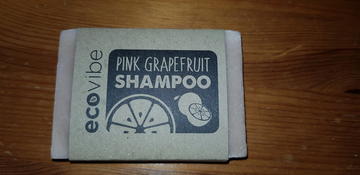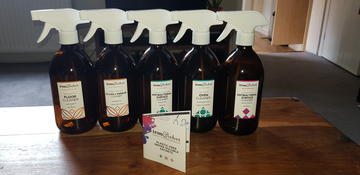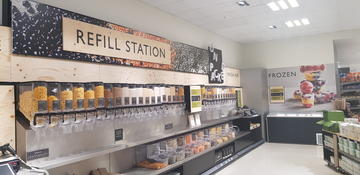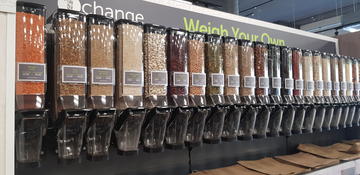At the same time, we are constantly reminded of the necessity to maintain a healthy weight and to watch our BMI very closely to avoid being another ‘lifestyle-induced’ statistic in the healthcare system. Of course, we are becomingly increasingly aware too of the environmental cost of many of our food choices, both from the manufacturing perspective but also the undeniable devastation that farming and the meat/dairy industry has on our ecosystems. In order to fully appreciate the impact of healthier consumption, the BMI is unfortunately not the only index we should be obsessed with on a day-to-day basis. Another, coined surprisingly recently by a quirky Dutch organisation called the Plastic Soup Foundation, is the PMI which, in case you haven’t already guessed, stands for Plastic Mass Index. The Plastic Soup Foundation have devised a clever app called My Little Plastic Footprint that calculates your PMI and helps you to embark on a life-changing plastic diet (hopefully with sustained improvements and results, unlike some of the trendy weight loss options that are even less appealing than they are effective – cabbage soup diet, anyone?). Their major mission is to raise awareness around the ubiquitous nature of plastic from the bulkier items we have been conditioned to believe are necessary for our survival (a toothbrush, for example) that are inevitably ending up in our precious oceans, to the particles we cannot see but that manage to infiltrate our being in every way and cause yet not well established health issues (the microparticles).
I started this ‘Plastic Free’ journey at the beginning of the month thinking I could do away with a few common consumables, replacing them with more sustainable alternatives but I have come out the other side awakened to the sheer enormity of what it means to pledge ‘Plastic Free’. I will give you some insight into what I have managed to achieve in a month, and some ideas of my upcoming plans and hopefully this will be the start of a long, determined plastic diet for me and maybe even motivate you to begin your own journey.

Ecovibe shampoo bar
As Plastic Free July kicked off during lockdown, I started with replacing what was most obvious to me – all of the things cluttering my new forced hangouts around the house. Fortuitously, I was running low on a number of hygiene products and I was moving house by the end of the month so it was an ideal time to make some important changes. Starting with personal hygiene, I swapped my usual spray on deodorant for a great alternative, a completely plastic- and aluminium-free roll on that comes with delicious-smelling compostable refills, made by the company called Wild. I decided also to branch out with my shampoo habits, transitioning from liquid to bar, by purchasing a hunk of grapefruit goodness from EcoVibe.
I was hasty to doubt this move though, not enjoying having my hair caked to my sculp even after far too many minutes of agitated rinsing than can be justified. I seriously contemplated forgoing the bar entirely (using it as a body wash instead) and trying another renewable liquid version but then my Scientist instincts kicked in. After approximately a minute of research, I came across a very useful blog that helped me to transition away from what my hair had become so accustomed to and toward a much gentler, more natural alternative for both my locks and the environment (read the blog here if you are considering the change too: Lush shampoo bars). I have also stowed away my overused, splayed out plastic toothbrushes for when some targeted deep (non-dental) cleaning is needed, and replaced them with a fun bamboo alternative. I already had one from South Africa waiting to be put to good use, but I have since found a source for future purchases with the option of coloured (and even multicoloured) bristles from the Epic Bazaar. If nothing else, by this point I had realised that the companies looking out for our planet are also by far the most creative when it comes to names and marketing (and my Instagram feed has become a whole lot more interesting too!). In line with cleaning, I put EcoVibe to good use and also bought their refillable glass spray cleaning bottles and dissolvable solutions, a pack of compostable sponges (top tip: cut these in half to double their utility) and other nifty household items that can do with an easy switcheroo.

Ecovibe refill cleaning spray bottles
I will leave you with one final hygiene-related change that I have made, and that is loo roll. I spent hours scrolling through even more weird and wonderful small companies trying to make their mark in this facet of the sustainable market and here some that received the biggest chuckle from me: Cheeky Panda; Uranus Wiper; Bumboo; Naked Sprout and, without a doubt the most brazen, Who Gives a Crap. After all of that, again opting for direction from a great blog (read it here: Plastic free toilet paper), I was swayed to choose the arguably more boring option from EcoLeaf, based on the culmination of a number of important positive factors besides being produced from sustainable materials, such as being solely UK-based, not having individually wrapped rolls, low cost and so on. I have also started shopping for groceries almost exclusively at the infamous Waitrose in Botley, opting for as many plastic-free and refillable products as possible (you can even find beer and wine on tap here!), but also at the new and improved Co-Op, also in Botley, which has integrated some similar sustainability enhancements. I have acquired a range of great glass bell jars to house the variety of refillable grains and pastas I am now buying, which is an aesthetic plus in the kitchen too!

Waitrose Botley refill station

Co-op Botley refill stations
I am fully aware that I have by no means even scratched the surface of achieving a plastic-free lifestyle, but I am certainly on the road towards more sustainable living and I am excited to keep shifting the balance towards the optimal PMI. Other changes I have since decided to commit to are working towards a more Vegan or, at the very least, sustainably-sourced diet and embarking on the even grander challenge of inciting sustainable change within my lab and workplace.